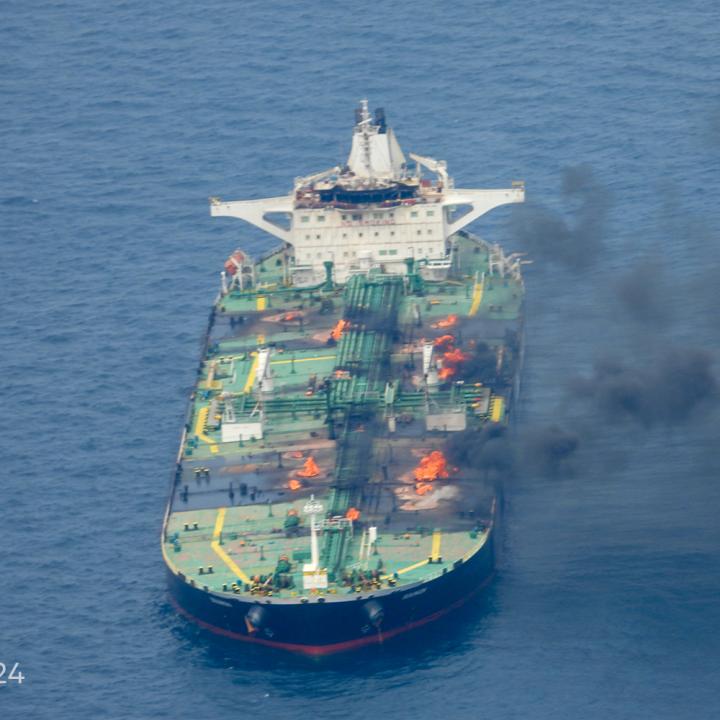
- Policy Analysis
- PolicyWatch 3922
Five Lessons from the Sounion Salvage Crisis in the Red Sea

The United States and its partners should take several immediate steps to avoid an environmental disaster, counter the Houthi spin about the incident, and prevent the group from creating other hazmat emergencies in the Red Sea.
On August 21, Houthi forces in Yemen launched multiple attacks against the Greek-flagged crude oil tanker Sounion (IMO 9312145) in the southern Red Sea. The barrage forced the crew to abandon a vessel laden with around 900,000 barrels of Iraqi crude, and fires have burned on the deck for days, reportedly caused by explosives planted during a Houthi boarding operation. To avert an environmental disaster, the ship needs to be towed away from its current high-risk location and into a safe port—otherwise, it could produce a catastrophic oil spill that affects the entire Red Sea neighborhood, contaminating waters used by fisheries, sea life, and desalination plants while causing further disruptions to global shipping traffic.
As of this writing, the European Union Naval Force Aspides (EU NAVFOR) reports that no oil spill has been detected (contrary to some media reports) and the ship is no longer drifting. For their part, the Houthis have apparently agreed to allow a towing and salvage operation. Yet these reports should not be interpreted as signs that the stricken ship is out of danger, nor that the Houthis will stop attacking laden oil tankers now that they have seen the environmental risks to Yemen firsthand. Indeed, the Sounion incident holds several immediate lessons for the United States and other actors as they seek the best means of quickly securing the ship, preventing a disastrous spill, and resolving the wider Red Sea crisis:
Avoid salvage delays and grant sanctions exemptions. Conducting salvage operations during the Houthis’ months-long attack campaign in the Red Sea has been challenging, and the Sounion incident will be no different. Finding suitable tugboats that are located near the region and willing to operate in such a risky environment can be difficult, and additional delays can arise if salvors hire boats subject to U.S. sanctions. This was reportedly the case with two recent salvage operations in the Red Sea and Gulf of Aden—the former of which had to be abandoned when the ship wound up sinking. In each case, the chosen tugboats were connected to an Emirati-based company that had engaged in a “significant transaction for the transport of petrochemical products from Iran.” These same boats are reportedly being hired to tow the Sounion as well; if so, Washington should grant immediate exemptions for their use, since further delays will only increase the danger to the tanker’s structural integrity.
Prepare for technical and force-protection challenges. Towing operations related to previous Houthi maritime incidents have faced setbacks due to technical problems and Houthi interference. Any such problems will need to be dealt with quickly in the current case given the potential for a major oil spill. Although the contours and timing of the Sounion salvage operation remain uncertain for now, naval forces (particularly those affiliated with Aspides) will need to remain near the tanker to prevent the Houthis from interrupting the process. Experience has shown that the group is willing to interfere with salvage efforts if they can turn the situation into a political bargaining chip—as seen most prominently during the protracted mission to empty the FSO Safer, a decaying storage vessel that remained in limbo for years despite the risks of environmental disaster. Therefore, all stakeholders need to maintain pressure on the group (including through diplomacy) until the worst-case Sounion scenario is definitively averted.
Prevent the Houthis from “returning to the scene.” As noted above, Houthi forces apparently returned to the Sounion and planted explosives in the days after their initial attacks, sparking the fires that are still burning as of this writing. (The initial attacks reportedly involved unknown projectiles and an unmanned surface vehicle.) If these reports are true, they would align with the group’s known tactic of returning to stricken vessels once they are abandoned in order to inflict more damage. Such was the case when the bulk carrier Tutor (IMO 9942627) was attacked on June 12. After Houthi forces hit the vessel at least twice, it was left drifting and abandoned; they then returned for a final attack that led to its sinking. (For comprehensive information and analysis on the incidents discussed in this PolicyWatch and past Houthi attacks stretching back to 2019, see The Washington Institute’s maritime incident tracker.) In the future, U.S. and European forces should be prepared to offer immediate protection to any drifting or severely damaged vessels laden with hazardous cargo, thereby preventing the Houthis from returning to board, attack, and/or sink them.
Counter the Houthi spin. Given their track record so far, the Houthis will likely use various outlets—including their effective social media channels—to claim that they consented to a Sounion towing operation out of humanitarian and environmental concerns. Yet the group has repeatedly threatened, attacked, and even sank vessels carrying hazardous cargo, with no apparent concern for the local humanitarian impact in Yemen or elsewhere. In February, for instance, it launched missile strikes on the general cargo ship Rubymar (IMO 9138898), which sank two weeks later. When the vessel went down, it was carrying approximately 22,000 metric tons of ammonium phosphate-sulfate fertilizer and 280 metric tons of heavy fuel oil and marine diesel. In June, amid concerns about a possible pollution leak from this sunken cargo, the International Maritime Organization called for “contributions of oil pollution response equipment,” noting that Yemen is not equipped to handle such a disaster on its own.
If the Houthis do in fact try to spin the Sounion incident into a humanitarian “win,” the United States and its partners should counter with multimedia campaigns that show how the Houthis have been endangering their own people and the wider Red Sea region. U.S. Central Command has already been using social media to comment on the Houthi attacks. These efforts should be broadened to highlight all the vessels the group has severely damaged since November in solidarity with the Gaza war—among them the Rubymar, which was connected to a Lebanon-based company that had no links to Israel, the United States, or fellow coalition partner Britain.
Washington should also reemphasize the degree to which such attacks have disrupted regional trade—including with countries where other Iran-backed armed groups support the Houthis. Iraq is a glaring example: like the Sounion, two other tankers attacked this month were carrying cargoes loaded at the Basra oil terminal in southern Iraq and bound for Europe, according to data from Kpler and MarineTraffic. Even Iran, the group’s top supporter, has not been spared from such incidents—in late May, the Houthis attacked a bulk carrier in the southern Red Sea whose final destination was the Islamic Republic.
Consider escorts for Israel-linked ships. The Houthis are currently focused on attacking ships with any links to Israel, including vessels that do not visit Israel themselves but are owned/operated by entities that have other ships calling at Israeli ports. In this sense, the Sounion was a particularly tempting target. It is connected to the Greece-based company Delta Tankers, which had suffered two other attacks earlier this month: against the Delta Blue (IMO 9601235) and Delta Atlantica (IMO 9419101) as they sailed the Red Sea carrying Iraqi oil cargoes to a refinery in Greece, according to data from Kpler. Houthi statements about the Sounion attack mentioned that the ship belongs to a company that “has ties” with Israel and vessels calling at Israeli ports.
Although commercial ships cannot be forced to request naval escort, those that are especially vulnerable to attack should be asked to seriously consider this option. For example, naval missions operating in the region could add language about the importance of escorts in the regular guidance statements they issue to commercial vessels in the area, particularly while the Sounion is awaiting salvage. These statements should also note that turning off a vessel’s automatic identification system does not guarantee that it will be shielded from Houthi attacks.
Noam Raydan is a senior fellow at The Washington Institute and co-creator of its Maritime Spotlight series.



